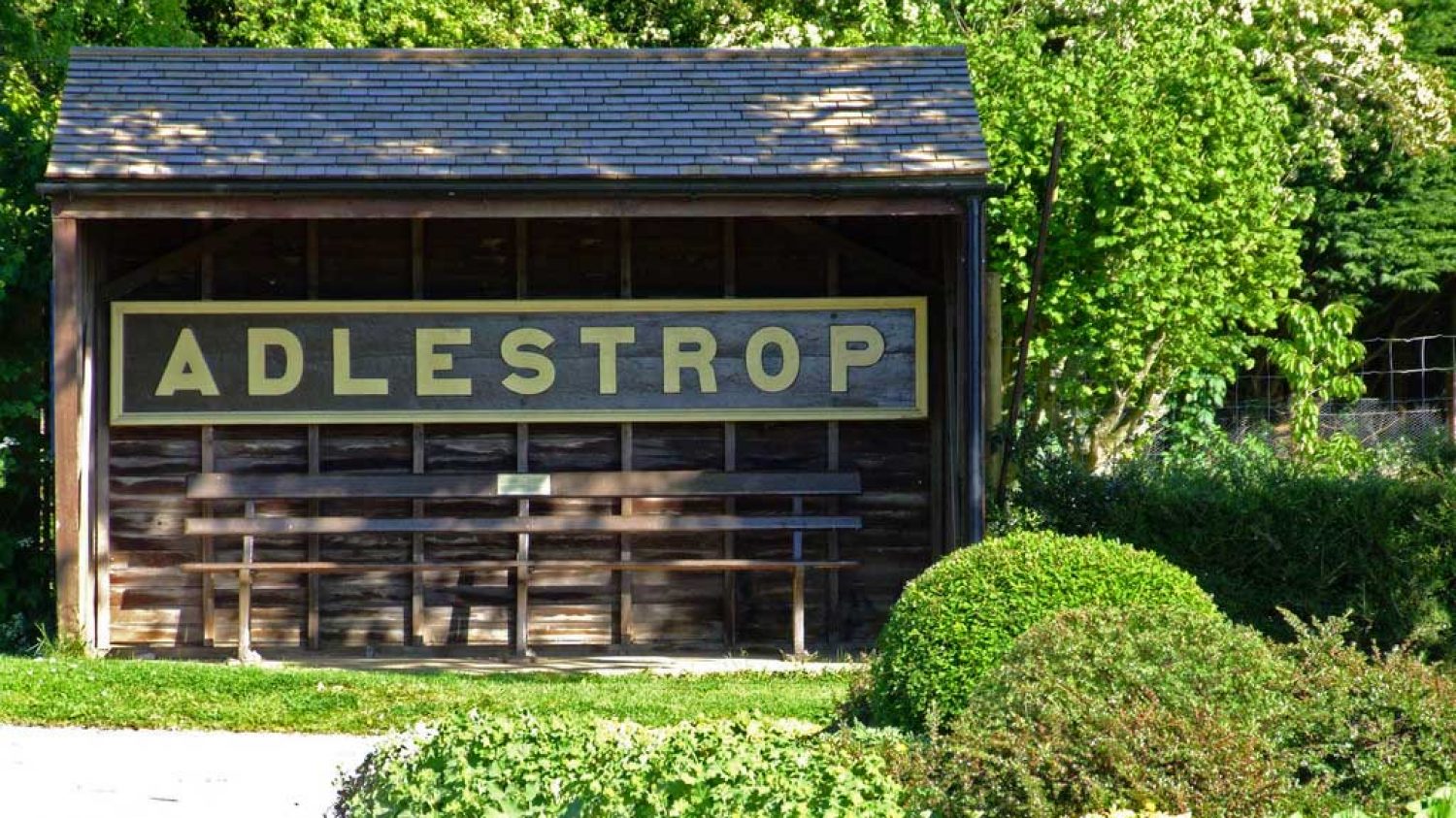Adlestrop by Edward Thomas
Yes. I remember Adlestrop—
The name, because one afternoon
Of heat the express-train drew up there
Unwontedly. It was late June.
The steam hissed. Someone cleared his throat.
No one left and no one came
On the bare platform. What I saw
Was Adlestrop—only the name
And willows, willow-herb, and grass,
And meadowsweet, and haycocks dry,
No whit less still and lonely fair
Than the high cloudlets in the sky.
And for that minute a blackbird sang
Close by, and round him, mistier,
Farther and farther, all the birds
Of Oxfordshire and Gloucestershire.

Edward Thomas, circa 1905
One hundred years ago, on 9 April, poet Edward Thomas died. Thomas made a name for himself as an essayist, literary critic and poet, before he became a soldier. Thomas was a friend of American poet Robert Frost. When the two men enjoyed walks together in the English countryside, Frost teased Thomas about dithering over which path to choose when there was more than one. Frost sent Thomas an advance copy of The Road Not Taken and Thomas, taking the joking message of the poem seriously, made the fateful decision to enlist. He was a married man in his mid 30s, and did not have to fight, but he went off to serve with the Royal Garrison Artillery. He was killed in action soon after, and was buried in a war graves cemetery in northern France.
His poem Adlestrop is a memory of a soldier on a troop train which makes an unscheduled stop at a tiny Gloucestershire village station. The natural world is wonderfully evoked – smells, sounds, sights. This is the England that the soldiers will be fighting to preserve – an England of rural beauty. Society is excluded from the poem ? “no one left and no one came”, but that allows the poet to fully appreciate all that nature offers.
The poem begins with the word ‘Yes’, as if he is answering a question or pulling an event from the depths of his memory. This opening creates an immediate relationship with the reader, and he then goes on to talk about that very English subject, the weather. There’s a conversational tone, a feeling of intimacy. The relaxed tone almost allows us to forget that the train holds young men who might be making their final journey.
The poem captures the essence of England – quaint train stations, county names, an unusual village name, blackbirds and meadowsweet. This is what he identifies with, and this of course is what he will most miss on the terrible battlefields of France. The wonderful harmony he feels with nature at Adlestrop, will soon be so rudely shattered – the birds will not be singing, and the heat will be of battle rather than that of a June afternoon.
You can still visit Adlestrop, but you cannot travel there by train as the station was closed in 1966. The station sign was saved and is on display in the village today, with words from the poem on a public bench. Edward Thomas never saw his poem in print, but its 16 poignant, beautiful lines give a slightly different view of World War I.
Listen to this gorgeous reading of the poem by Richard Burton.
Share your thoughts on this poem by leaving a comment.
Poem of the Month, June 2018 – Stopping by Woods on a Snowy Evening
Poetry Foundation: Edward Thomas
The Road Not Taken and Other Poems by Robert Frost
I only recommend books I have read and know. Some of these links are my affiliate links. If you buy a book by clicking on one of these links I receive a small commission. It doesn’t cost you anything extra, but does help cover the cost of producing my free newsletter.
Comments are moderated, and will not appear until approved.
[DISPLAY_ULTIMATE_PLUS]

fran woolley
In the mid 1990’s, I was teaching a class of very clever children.
One girl was to return to England, so the school she was to attend sent scholarship/entrance papers.
I was able to give my whole class the tests, which gave an interesting comparison of expectations of 12year olds in another country..
This poem was the set piece for comprehension.
My remembrance is that the children found deep comprehension of the text difficult, but there was, in speeches and in writing, an upsurge of the use of Unwontedly. (Always written with a capital, and spoken with the full stop.)
Susannah Fullerton
Thanks so much for sharing that story. I do love the thought of the word Unwontedly suddenly creeping in to the children’s schoolwork!
Ruth Williamson
Another poem expressing fierce nostalgia for rural England was “Grantchester” by Rupert Brooke, written just before the Great War this time, but also recreating an idealized view of English landscape. While some brooke’s poem contains phrases that are not strictly PC today, it does evoke the poet’s longing for a corner of England far removed from where he is actually located. There is a beautiful edition of the poem illustrated by photographs of the real place taken by Christine Jennings, with a commentary by Francis Burkitt. I am very fond of my copy, acquired in its place of origin!
Susannah Fullerton
Like you, I have been to Grantchester, which is gorgeous. I saw the clock standing at ten to three, but did not indulge in honey for tea. There is a statue of Brooke in the grounds of the Old Vicarage, now home to Lady Mary Archer. You can see the statue through the gates. I love to think of Brooke floating down the Cam river in a punt or rowboat, with a pile of books in the boat, reading as he went.